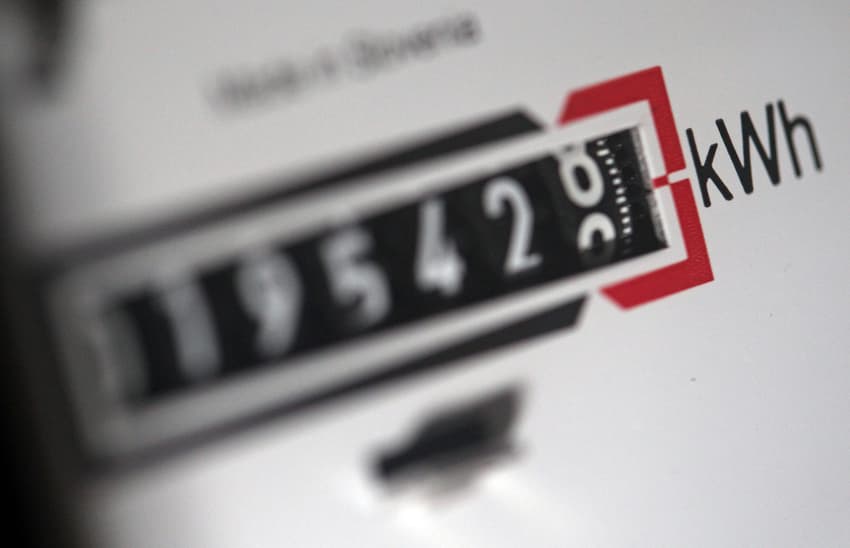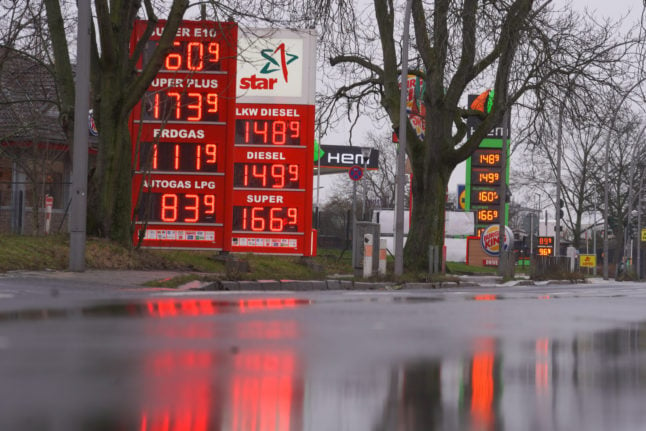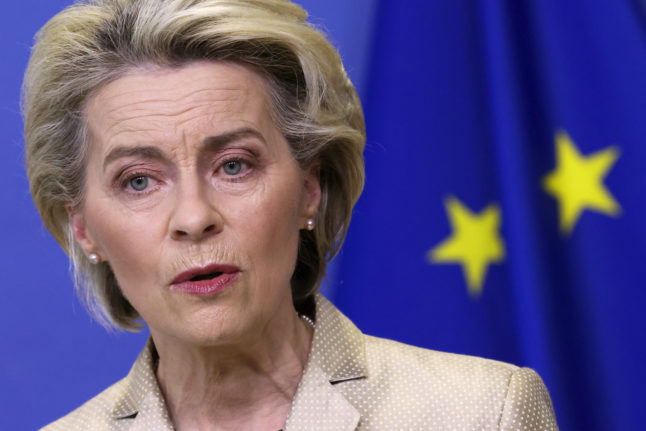KEY POINTS: Germany's proposals for future energy price relief

Germany's traffic-light coalition has produced a set of draft proposals for a new package of energy relief measures - but the cabinet is said to be split on which ones to implement. Here are the key plans being discussed.
With energy prices continuing to soar, yet another package of relief measures is in the pipelines. But each of the parties that make up the traffic-light coalition - the SPD, Greens and FDP - has their own distinct vision on how best to support businesses and consumers.
A set of draft proposals obtained by ARD-Hauptstadtstudio lays out a number of potential measures that could be used to offer relief on fuel, heating and electricity costs.
According to ARD, there are still a number of disagreements around the plans, but the government hopes to produce a finalised package of measures on Wednesday evening.
Here are the key points in the draft proposals to be discussed.
Fuel and car-tax rebate
Above all, the pro-business FDP is pushing for relief for car owners.
Following two consecutive increases to the commuter allowance - which allows employees to write-off some of the costs of travelling to work - there could be further financial support on the horizon.
The key measure put forward by Finance Minister Christian Lindner (FDP) is a fuel rebate for car drivers. This plan would see drivers treated to an instant discount at the pump, which petrol station operators would then have to claim back from the tax office.
Also included in the measures is a "one-off rebate" in car tax. Presumably this would be claimed by drivers in their 2022 tax return, meaning more in their pockets in the coming year.
The FDP are likely to face pushback on these ideas from the Greens and from Economics Minister Robert Habeck in particular, who has previously spoken out against a potential fuel rebate.
READ ALSO: German government announces fresh relief package for high energy costs
Expansion of natural gas production
The FDP are also said to be in favour of expanding Germany's domestic natural gas production. The question of how to secure natural gas is a particularly urgent one in light of the ongoing Ukraine war and Germany's attempts to ween itself off Russian gas.
This question would have to carefully thrashed out with the Greens, however, particularly when it comes to investing funds that could be used for renewables instead.
Ban on gas heating for new-builds
With the double-pronged goal of being climate-friendly and socially minded, the Greens are allegedly asking for a ban on gas heating systems from 2023.
Though existing buildings with gas heating wouldn't be affected, the ban would affect any new housing developed after next year by banning the installation of this type of heater.
Energy money
Another classic policy from the Greens contained in the paper in the disbursement of so-called 'energy money' or an 'energy fund'. This proposal was contained in the Greens' pre-election manifesto but so far hasn't been implemented due to questions about how to distribute it.
Essentially, the energy money is a redistribution of the CO2 tax back to consumers - with lower-income households and those who use less energy benefitting the most.
According to ARD, the Greens now propose that the Finance Ministry develop a way of doling out the money to German taxpayers using their tax ID. The deadline for this would be October.

Current petrol and diesel prices are listed outside a petrol station on Prenzlauer Alley in Berlin. Photo: picture alliance/dpa | Jörg Carstensen
One-off energy subsidy
The centre-left SPD, who are also the largest party in the coalition, have set their sights on measures for lower-income and vulnerable groups.
The first of these would be a one-time subsidy for workers in Germany, which would be tapered by income and according to the number of children in any given family. One key issue with this is that the relief would be applied to the 2023 tax return, which means it would be another two years before consumers experience any benefits.
Apparently, the FDP are firmly against this idea and early signs are that it could be replaced with a so-called mobility allowance for people on small and medium incomes.
The exact amounts of either type of relief are currently unclear and would presumably have to be thrashed out in the cabinet.
READ ALSO: EXPLAINED: What Germany’s relief package against rising prices means for you
Child bonus and more for benefit recipients
Another SPD proposal is that a child bonus (Kinderbonus) - similar to the one introduced during the initial waves of the Covid pandemic - should be brought in again "as soon as possible".
The SPD also wants to ensure that the flat-rate heating allowance for housing benefit recipients, which was agreed in the last package of measures, is paid on a long-term basis.
They also suggest increasing the current supplement by a further €100 as a one-off bonus this year.

Money and dummies lie together on a table. The SPD is believed to be pushing for a new 'child bonus' for families. Photo: picture alliance/dpa/dpa-tmn | Christin Klose
Senior citizens' lump sum
Pensioners should also benefit from a one-time energy payout, according to the proposals.
The draft outlines the importance of elderly people remaining mobile in the community, even if they aren't travelling to work each day.
The SPD is apparently also concerned about public transport fares and wants the coalition to ensure that bus and train fares do not rise or that services aren't cut as a result of rising fuel prices.
READ ALSO:
- German pensions to rise above forecasted level this year
- German public transport slammed as ‘failure’ as half of users switch to car
What about a cap on energy prices?
This is a measure that the EU Commission is said to be considering at present, alongside other measures such as joint gas purchases throughout the bloc. The EU package of measures will also be discussed on Wednesday.
But Germany is believed to be one of the primary voices against such a measure, with the FDP in particular speaking out against any state intervention in the natural gas or mineral oil markets.
A more liberal-friendly policy would be to cut taxes on things like electricity and gas in order to provide relief for both businesses and consumers. However, the issue with this is that businesses could use the tax cuts as a means of accruing more profit and continue to raise their prices regardless.

EU Commission President Ursula von der Leyen (CDU). The EU is currently considering an energy price cap, among other measures. Photo: picture alliance/dpa/dpa-tmn | Christin Klose
When will these measures come in?
As we mentioned, it's still very early days yet - and many of the policies outlined above the subject of fierce debate within the cabinet.
What we're likely to see later on Wednesday is some kind of Frankenstein's Monster, with different measures cobbled together from each party.
Some of these may offer more immediate support - like the child bonus or the energy supplement - while other types of support could be doled out through tax rebates and may therefore take several months or years to come into force, which won't be much comfort to people struggling at the moment.
Others, like the Greens' proposals to ban gas heating, would be structural measures dedicated to the transition away from volatile and climate-damaging fossil fuels. The benefits of these presumably wouldn't be felt for several years.
Comments
See Also
With energy prices continuing to soar, yet another package of relief measures is in the pipelines. But each of the parties that make up the traffic-light coalition - the SPD, Greens and FDP - has their own distinct vision on how best to support businesses and consumers.
A set of draft proposals obtained by ARD-Hauptstadtstudio lays out a number of potential measures that could be used to offer relief on fuel, heating and electricity costs.
According to ARD, there are still a number of disagreements around the plans, but the government hopes to produce a finalised package of measures on Wednesday evening.
Here are the key points in the draft proposals to be discussed.
Fuel and car-tax rebate
Above all, the pro-business FDP is pushing for relief for car owners.
Following two consecutive increases to the commuter allowance - which allows employees to write-off some of the costs of travelling to work - there could be further financial support on the horizon.
The key measure put forward by Finance Minister Christian Lindner (FDP) is a fuel rebate for car drivers. This plan would see drivers treated to an instant discount at the pump, which petrol station operators would then have to claim back from the tax office.
Also included in the measures is a "one-off rebate" in car tax. Presumably this would be claimed by drivers in their 2022 tax return, meaning more in their pockets in the coming year.
The FDP are likely to face pushback on these ideas from the Greens and from Economics Minister Robert Habeck in particular, who has previously spoken out against a potential fuel rebate.
READ ALSO: German government announces fresh relief package for high energy costs
Expansion of natural gas production
The FDP are also said to be in favour of expanding Germany's domestic natural gas production. The question of how to secure natural gas is a particularly urgent one in light of the ongoing Ukraine war and Germany's attempts to ween itself off Russian gas.
This question would have to carefully thrashed out with the Greens, however, particularly when it comes to investing funds that could be used for renewables instead.
Ban on gas heating for new-builds
With the double-pronged goal of being climate-friendly and socially minded, the Greens are allegedly asking for a ban on gas heating systems from 2023.
Though existing buildings with gas heating wouldn't be affected, the ban would affect any new housing developed after next year by banning the installation of this type of heater.
Energy money
Another classic policy from the Greens contained in the paper in the disbursement of so-called 'energy money' or an 'energy fund'. This proposal was contained in the Greens' pre-election manifesto but so far hasn't been implemented due to questions about how to distribute it.
Essentially, the energy money is a redistribution of the CO2 tax back to consumers - with lower-income households and those who use less energy benefitting the most.
According to ARD, the Greens now propose that the Finance Ministry develop a way of doling out the money to German taxpayers using their tax ID. The deadline for this would be October.

One-off energy subsidy
The centre-left SPD, who are also the largest party in the coalition, have set their sights on measures for lower-income and vulnerable groups.
The first of these would be a one-time subsidy for workers in Germany, which would be tapered by income and according to the number of children in any given family. One key issue with this is that the relief would be applied to the 2023 tax return, which means it would be another two years before consumers experience any benefits.
Apparently, the FDP are firmly against this idea and early signs are that it could be replaced with a so-called mobility allowance for people on small and medium incomes.
The exact amounts of either type of relief are currently unclear and would presumably have to be thrashed out in the cabinet.
READ ALSO: EXPLAINED: What Germany’s relief package against rising prices means for you
Child bonus and more for benefit recipients
Another SPD proposal is that a child bonus (Kinderbonus) - similar to the one introduced during the initial waves of the Covid pandemic - should be brought in again "as soon as possible".
The SPD also wants to ensure that the flat-rate heating allowance for housing benefit recipients, which was agreed in the last package of measures, is paid on a long-term basis.
They also suggest increasing the current supplement by a further €100 as a one-off bonus this year.

Senior citizens' lump sum
Pensioners should also benefit from a one-time energy payout, according to the proposals.
The draft outlines the importance of elderly people remaining mobile in the community, even if they aren't travelling to work each day.
The SPD is apparently also concerned about public transport fares and wants the coalition to ensure that bus and train fares do not rise or that services aren't cut as a result of rising fuel prices.
READ ALSO:
- German pensions to rise above forecasted level this year
- German public transport slammed as ‘failure’ as half of users switch to car
What about a cap on energy prices?
This is a measure that the EU Commission is said to be considering at present, alongside other measures such as joint gas purchases throughout the bloc. The EU package of measures will also be discussed on Wednesday.
But Germany is believed to be one of the primary voices against such a measure, with the FDP in particular speaking out against any state intervention in the natural gas or mineral oil markets.
A more liberal-friendly policy would be to cut taxes on things like electricity and gas in order to provide relief for both businesses and consumers. However, the issue with this is that businesses could use the tax cuts as a means of accruing more profit and continue to raise their prices regardless.

When will these measures come in?
As we mentioned, it's still very early days yet - and many of the policies outlined above the subject of fierce debate within the cabinet.
What we're likely to see later on Wednesday is some kind of Frankenstein's Monster, with different measures cobbled together from each party.
Some of these may offer more immediate support - like the child bonus or the energy supplement - while other types of support could be doled out through tax rebates and may therefore take several months or years to come into force, which won't be much comfort to people struggling at the moment.
Others, like the Greens' proposals to ban gas heating, would be structural measures dedicated to the transition away from volatile and climate-damaging fossil fuels. The benefits of these presumably wouldn't be felt for several years.
Join the conversation in our comments section below. Share your own views and experience and if you have a question or suggestion for our journalists then email us at [email protected].
Please keep comments civil, constructive and on topic – and make sure to read our terms of use before getting involved.
Please log in here to leave a comment.